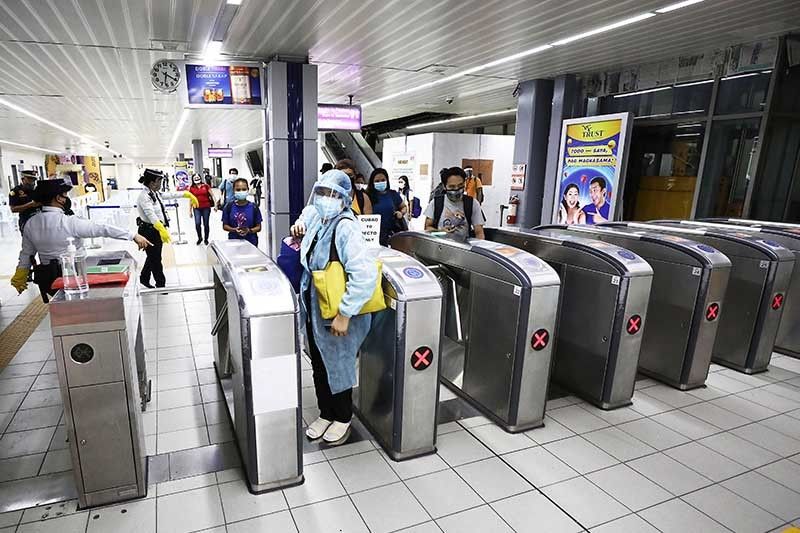COVID-19 cases hit 18,638 as Philippines eases virus lockdown

MANILA, Philippines — The Philippines said its caseload of novel coronavirus infections reached 18,638 Monday as Metro Manila and other areas at high-risk of virus transmission shifted to a more relaxed community quarantine that allowed more businesses to reopen and workers to return to their jobs.
The Department of Health reported 552 new cases. Of the additional cases, 119 were classified “fresh” or test results that were released to patients in the last three days, while 433 were “late” cases from the agency’s testing backlog.
The total number of patients who have survived COVID-19 increased to 3,979 with the recovery of 70 more patients.
But fatalities related to COVID-19 also rose to 960 after three fatalities were added to the toll.
Metro Manila—home to more than 12 million people and the epicenter of the nation’s outbreak—transitioned to the more relaxed general community quarantine Monday. After nearly three months, workers in the capital region returned to their jobs that were shut by virus lockdown and dealt with limited public transit.
In easing one of the world's longest lockdowns, the DOH said the slower case and mortality doubling time and the critical care utilization rate guided the decision of the government.
The novel coronavirus pandemic has infected at least 6.1 million people and killed over 367,000 since it first emerged in China in December last year.
Follow this page for updates on a mysterious pneumonia outbreak that has struck dozens of people in China.
New Zealand Prime Minister Chris Hipkins says on Sunday that he had contracted COVID-19, testing positive at a key point in his flailing campaign for re-election.
Hipkins saYS on his official social media feed that he would need to isolate for up to five days -- less than two weeks before his country's general election.
The leader of the centre-left Labour Party said he started to experience cold symptoms on Saturday and had cancelled most of his weekend engagements. — AFP
The World Health Organization and US health authorities say Friday they are closely monitoring a new variant of COVID-19, although the potential impact of BA.2.86 is currently unknown.
The WHO classified the new variant as one under surveillance "due to the large number (more than 30) of spike gene mutations it carries", it wrote in a bulletin about the pandemic late Thursday.
So far, the variant has only been detected in Israel, Denmark and the United States. — AFP
The World Health Organization says on Friday that the number of new COVID-19 cases reported worldwide rose by 80% in the last month, days after designating a new "variant of interest".
The WHO declared in May that Covid is no longer a global health emergency, but has warned that the virus will continue to circulate and mutate, causing occasional spikes in infections, hospitalisations and deaths.
In its weekly update, the UN agency said that nations reported nearly 1.5 million new cases from July 10 to August 6, an 80% increase compared to the previous 28 days. — AFP
The head of US intelligence says that there was no evidence that the COVID-19 virus was created in the Chinese government's Wuhan research lab.
In a declassified report, the Office of the Director of National Intelligence (ODNI) says they had no information backing recent claims that three scientists at the lab were some of the very first infected with COVID-19 and may have created the virus themselves.
Drawing on intelligence collected by various member agencies of the US intelligence community (IC), the ODNI report says some scientists at the Wuhan lab had done genetic engineering of coronaviruses similar to COVID-19. — AFP
Boris Johnson deliberately misled MPs over Covid lockdown-breaking parties in Downing Street when he was prime minister, a UK parliament committee ruled on Thursday.
The cross-party Privileges Committee said Johnson, 58, would have been suspended as an MP for 90 days for "repeated contempts (of parliament) and for seeking to undermine the parliamentary process".
But he avoided any formal sanction by his peers in the House of Commons by resigning as an MP last week.
In his resignation statement last Friday, Johnson pre-empted publication of the committee's conclusions, claiming a political stitch-up, even though the body has a majority from his own party.
He was unrepentant again on Thursday, accusing the committee of being "anti-democratic... to bring about what is intended to be the final knife-thrust in a protracted political assassination".
Calling it "beneath contempt", he said it was "for the people of this to decide who sits in parliament, not Harriet Harman", the veteran opposition Labour MP who chaired the seven-person committee. — AFP
- Latest
- Trending






























